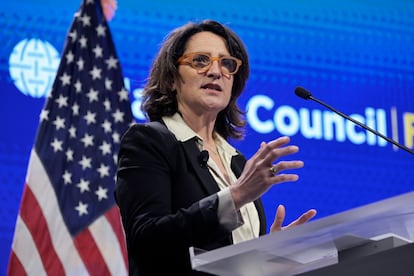EU preparing first fines against tech giants Apple and Meta
Competition Commissioner Teresa Ribera is getting ready to impose sanctions on the tech giants for non-compliance with the Digital Markets Act. But European authorities are not expected to impose the highest possible sanction


The European Commission is preparing fines against Apple and Meta for violating the Digital Markets Act (DMA), according to sources familiar with the investigations. If so, they would be the first sanctions against major technology companies since Spain’s Teresa Ribera became Vice President of the European Commission and competition Commissioner. The move that Brussels is considering against the U.S. tech giants comes in the middle of the trade war unleashed by Donald Trump, who has announced massive tariffs on multiple regions and countries around the world.
It’s been just over a year since the European Commission opened an investigation into four major U.S. technology companies (Apple, Alphabet, Amazon, and Meta) for breaching Europe’s digital market regulations. The four companies, along with the other so-called gatekeepers of the digital market (due to their large size and potential risk to competition), have greater obligations than other companies, and the probes were opened in response to indications of non-compliance with some of these requirements. The investigations have been progressing over the past few months, and the first conclusions are now emerging, which will likely result in fines.
The same sources said that the sanctions are not expected to reach the maximum provided for in the regulation, that is to say, 10% of the company’s global revenue. There are various explanations for this: one is that the period of non-compliance would be approximately one year, as the DMA came into force in phases between 2023 and 2024. The largest fine imposed by the Competition Authority to date was in July 2018 against Google for market abuse that, according to the Commission, had existed since 2011. The amount of the fine was €4.3 billion. Several legal sources also noted that Brussels rarely invokes this maximum limit and that its largest penalties usually opt for percentages of around 3% of global revenue.
Commissioner Ribera was in Washington D.C. last week to participate in an event where she met with U.S. antitrust authorities, including Gail Slater, head of the Department of Justice’s antitrust section, and Andrew Ferguson, chairman of the Federal Trade Commission. It was the first contact between the two administrations, and the main objective was to confirm the continued collaboration they have maintained over the past decade.
Brussels has always tried to keep separate the application of its digital regulations — both the Digital Markets Act and the Digital Services Act (DSA) — as well as the fines, from the trade war and the serious geostrategic differences that have emerged between Washington and Brussels since Trump returned to the White House. The EU’s explanation is always that the European Commission has an obligation to enforce the law, and that this is non-negotiable and cannot depend on external circumstances. An example of this is what happened on March 19: the Commission decided to force Apple to open the iPhone’s digital ecosystem to third parties, which is a bigger blow than a fine of any size, as it implies a change in the company’s business model.
The latter kind of move is something that worries large tech companies much more than sanctions. These companies earn a lot of money; in some cases, their stock market capitalization far exceeds the GDP of entire countries: Apple’s stock value is almost double the GDP of Spain, for instance. Therefore, at the headquarters of these tech giants, greater attention is paid when they are forced to change their business model because Brussels has concluded that their current practices may pose a risk of market abuse.
“This is not just about fines — it’s about the Commission kneecapping successful American businesses simply because they’re American, while letting Chinese and European rivals off the hook,” said a source familiar with the investigation into Meta, Facebook’s parent company, Politico reported. This highly political argument — much more so than corporate statements usually are — maintains the position it evidenced at the beginning of the year. At that time, Meta’s CEO, Mark Zuckerberg, announced that his company was discontinuing content moderation on its social networks (Facebook and Instagram) and attacked European digital regulations, although he targeted the markets regulation less than the services regulation, which is more focused on content than on market practices.
Zuckerberg’s words are not so far removed from those spoken by U.S. Vice President J.D. Vance during his trip to Europe in February. Back then, in a speech in Paris, he criticized what he considered excessive regulation of tech companies. European and U.S. regulations have always been very different. U.S. regulations are very market-driven, focused on ensuring freedom of enterprise and freedom of expression above other fundamental rights; European regulations, on the other hand, are more rights-driven and seek a balance between all fundamental rights, consumer rights, and the market economy, as Anu Bradford, a digital regulation expert at Columbia University, explains in her latest book, Digital Empires: The Global Battle to Regulate Technology.
However, what Vance said in Paris goes further. “The Trump administration is troubled by reports that some foreign governments are considering tightening the screws on U.S. tech companies with international footprints. Now, America cannot and will not accept that, and we think it’s a terrible mistake not just for the United States of America but for your own countries,” he warned.
Sign up for our weekly newsletter to get more English-language news coverage from EL PAÍS USA Edition
Tu suscripción se está usando en otro dispositivo
¿Quieres añadir otro usuario a tu suscripción?
Si continúas leyendo en este dispositivo, no se podrá leer en el otro.
FlechaTu suscripción se está usando en otro dispositivo y solo puedes acceder a EL PAÍS desde un dispositivo a la vez.
Si quieres compartir tu cuenta, cambia tu suscripción a la modalidad Premium, así podrás añadir otro usuario. Cada uno accederá con su propia cuenta de email, lo que os permitirá personalizar vuestra experiencia en EL PAÍS.
¿Tienes una suscripción de empresa? Accede aquí para contratar más cuentas.
En el caso de no saber quién está usando tu cuenta, te recomendamos cambiar tu contraseña aquí.
Si decides continuar compartiendo tu cuenta, este mensaje se mostrará en tu dispositivo y en el de la otra persona que está usando tu cuenta de forma indefinida, afectando a tu experiencia de lectura. Puedes consultar aquí los términos y condiciones de la suscripción digital.








































